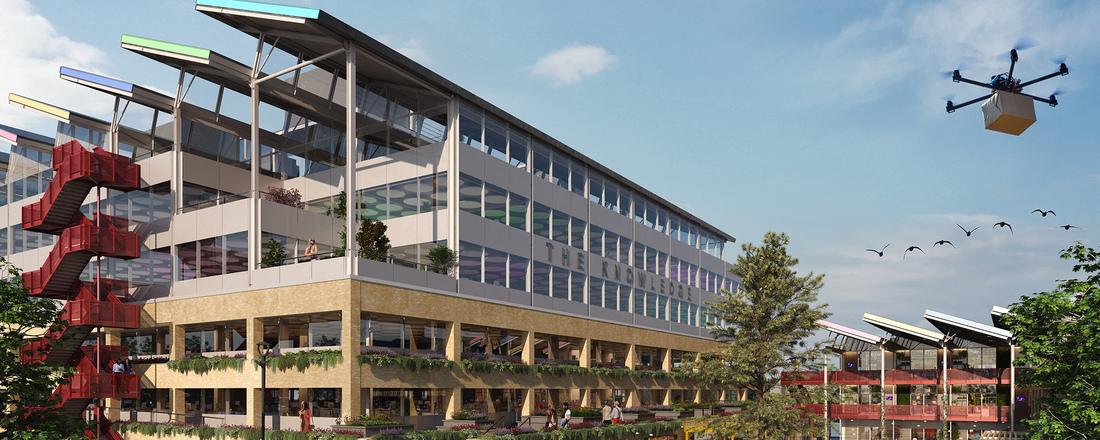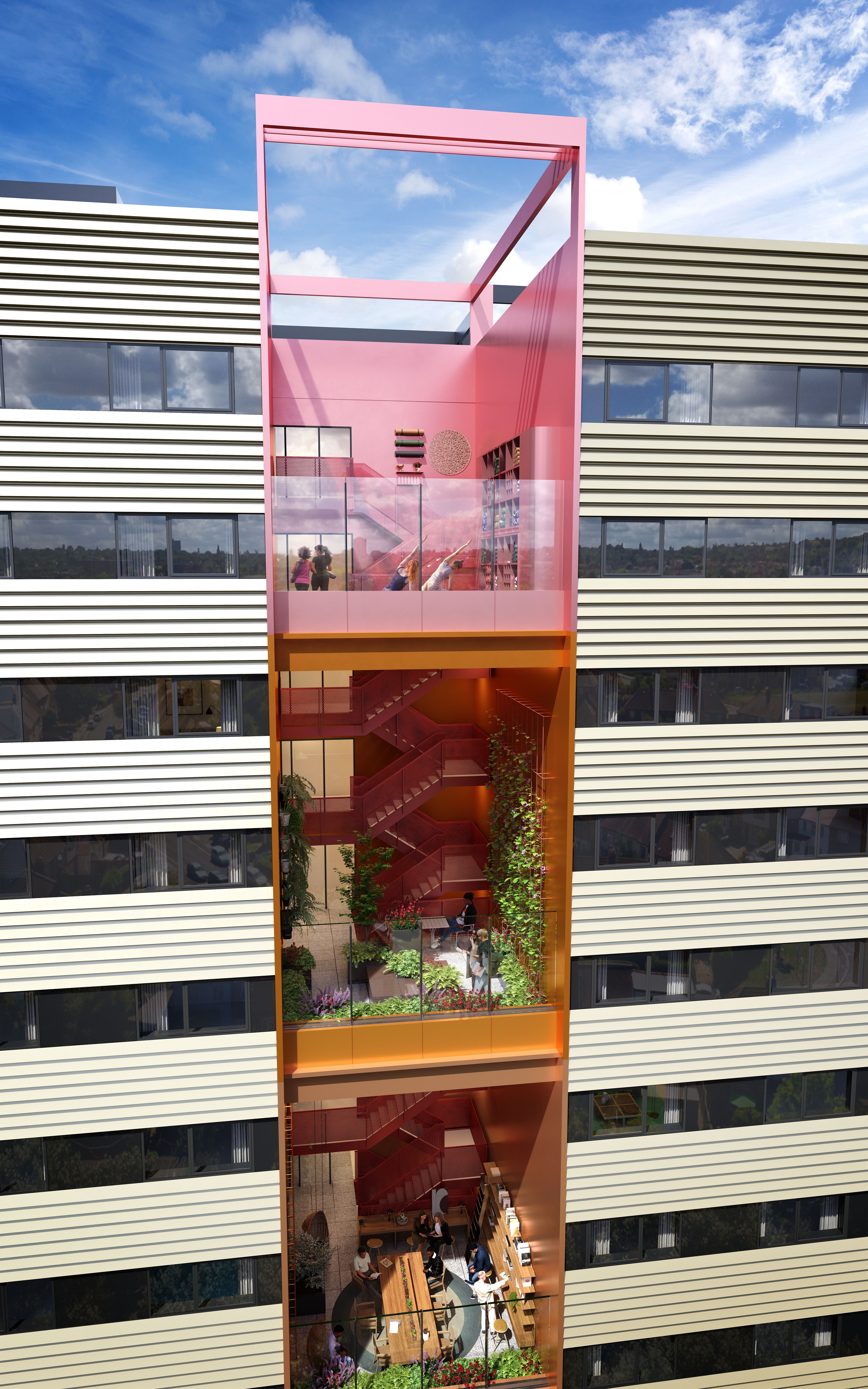Get updates from The Developer straight to your inbox Yes, please!
Socius on Milton Keynes: “Why is anybody doing greenfield development?”
Barry Jessup, Managing Director and Olaide Oboh, Director of developer Socius talk about Milton Keynes, B Corporations and why brownfield development is the only way to go

“Nearly everyone has heard of Milton Keynes, but it’s amazing how few have actually visited,” says Barry Jessup, Managing Director at developer Socius.
We’re talking about MK Gateway, the £180m mixed-use development that Socius is developing with Patron Capital in Milton Keynes. I’m interviewing Jessup and Olaide Oboh, Director of Socius, for The Developer Podcast, available to stream now.
If you haven’t heard of Socius, you might know them under their previous incarnation, First Base, which separated into two independent companies in January 2022. Socius is taking forward existing mixed-use, urban regeneration projects in Bristol, Brighton, Milton Keynes and Cambridge, while First Base is focussed on public/private partnerships and its housing vehicle, First Affordable, under the direction of Elliot Lipton. The businesses are still linked, however: First Base has retained investments in Socius, while Jessup is still a director and shareholder of First Base.
“With Socius, it’s the same team and the same projects and investors, but hopefully with an opportunity to double down on some of the things we feel passionately about,” says Jessup. A self-styled “impactful developer”, Socius’ website describes its work as partnering with global investors “to balance profit alongside purpose whilst delivering inspiring and sustainable mixed-use places”.
Socius is seeking to become an accredited B Corporation, which Jessup says will make its ESG commitments (Environmental Social and Governance) more public and transparent: “This is much more than a badge for us. We have embedded our commitments to stakeholders and the environment, as well as shareholders, in our company articles, which means that our directors have a corporate responsibility to consider all these factors in key business decisions,” he writes.
“Our staff is passionate about this,” Jessup tells me during our podcast recording over Zoom. “From a commercial perspective, it’s important to attract and retain talent, but it’s also of commercial benefit, because we are seeing the investment market move towards us. We aren’t swimming against the tide, the tide has come in and is against our back.”
The focus is on brownfield, city-centre, sustainable, mixed-use development that makes a positive and quantifiable social impact. “We are in this to make a profit, but we don’t think that’s mutually exclusive to the other goals that we’ve set out,” Jessup tells me.
One of those goals is to be a fossil-fuel free developer when it comes to heating and hot water – an ambition that Olaide Oboh, Director, Socius, admits isn’t always possible. “Sometimes planning regulations require us to support a district heating system that is gas-fired… We build in flexibility hoping that there will be a future switch from gas to electric.”
Socius’ focus is on brownfield, never greenfield, development: “I don’t understand why anybody is doing greenfield development at all,” Jessup says. “There is plenty of brownfield development land available”.
Which takes us to Milton Keynes, where their planned development, MK Gateway, includes offices, retail, public space, a maker space and apartments. Saxon Court, the Modernist former council office building, will be retained and extended upwards, topped with colourful rooftop fins. Two new buildings, including a ‘vertical village’ of 288 apartments, will also be added to the site. The project is designed by Rogers Stirk Harbour + Partners (RSHP) who bring colour and contrast to the site through the playful juxtaposition of existing and new. The result is friendlier, accomplished somewhat at the expense of the formal elegance of the original building, which loses its symmetry and polarising gravitas.
Oboh describes Milton Keynes council as innovative and forward-thinking; willing to try new things and provide testing opportunities for new technologies. “They’ve rolled out 5G across the whole public realm, and that has brought out a number of companies that want to test their technology on 5G, including autonomous vehicles.”
“If you go to Milton Keynes today, you’ll see Starship robots delivering food and autonomous vehicles driving around… It’s live, it’s in progress, it’s happening today,” Oboh says. Powered by zero carbon electricity, the robots are part of the council’s commitment to become carbon neutral by 2030 and carbon negative by 2050.
The 5G rollout, robots and carbon commitments are examples of what Jessup describes as the ‘youthfulness’ of Milton Keynes, where ’youthful’ is a frame of mind more than a demographic. Jessup cites its burgeoning tech industry, leisure amenities like its famous Snozone snow dome as youthful, but Milton Keynes is also young in the literal sense, with 46% of the population under the age of 35, and ’new town’ Milton Keynes having been founded just 55 years ago.
Like a kid, it’s also growing up fast – although technically still a town, Milton Keynes is consistently ranked among the top 10 fastest growing cities in the UK.
As for the design approach, Jessup says they opted for RSHP as architect because they “fit really well in the Milton Keynes’ context”: “They’ve brought a massive amount of energy and ideas. That’s what we’re looking for: passion, creativity, fresh ideas and flexibility of thinking.”
The 34-storey tower, which is two-and-a-half times higher than Milton Keynes’ tallest building, is intended to set a new standard for Build-to-Rent apartments with its provision of shared sky gardens, each vertical village serving approximately 50 neighbours.
“Ultimately development and placemaking is about creating a story for a place, and it’s something that RSHP excel at. Creating a reason while people will be talking about MK Gateway for a long time is something that RSHP has really helped us to turn into a reality.”
Subscribe to The Developer Podcast wherever you get your podcasts, and sign up to The Developer Weekly email to find out when new episodes go live. You can support our podcast on Patreon at www.patreon.com/thedeveloperuk
If you love what we do, support us
Ask your organisation to become a member, buy tickets to our events or support us on Patreon
Sign up to our newsletter
Get updates from The Developer straight to your inbox
Thanks to our organisation members
© Festival of Place - Tweak Ltd., 124 City Road, London, EC1V 2NX. Tel: 020 3326 7238

